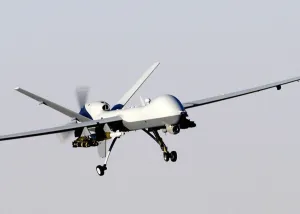On August 29th, just a day before the final withdrawal of United States troops from Afghanistan, US military intelligence apparently became aware of an imminent bomb threat from Islamic State-Khorasan (IS-K) against Hamid Karzai International Airport in Kabul. Three days earlier, an attack by IS-K at the same location resulted in the deaths of thirteen US troops and over 150 Afghan civilians. In evaluating the threat on August 29th, military officials identified a car and its driver as a potential target, and authorized a drone strike after tracking the driver and the vehicle for eight hours.
The drone's Hellfire missile struck the man and his car after he entered a compound in Kabul. US Central Command (CENTCOM) reported that it had eliminated an “imminent” threat to the airport and that it was unaware of civilian casualties, despite contrasting reports at the time.
Those reports, spearheaded by a New York Times investigation, proved correct, however. As is fairly well-known by this point, the driver under suspicion worked for an international aid organization, not IS-K; the compound belonged to members of his family; and the final death toll was ten civilians, seven of whom were children.
The Pentagon has issued an apology—a rarity when it comes to civilian casualties resulting from drone strikes—and offered financial restitution to surviving family members. But an internal investigation conducted by Air Force Lt. General Sami D. Said found no “criminal negligence” in the conduct of American military officials.
General Said claimed that, while it was obvious that the information guiding the strike was “inaccurate,” the strike was conducted according to reasonable procedures and without violation of domestic or international law. He added that higher level officials could pursue “accountability” but made no specific recommendations himself beyond new procedures to prevent future civilian deaths.
Such a finding is surely outrageous to readers. Seven children’s lives were snuffed out by a rather shadowy American military-intelligence unit, operating out of Qatar at the time. Unfortunately, within the confines of the law, rules, and regulations that determine military procedure, General Said is probably correct. But even if he weren’t correct, in the American national security system, accountability for breaking the rules rests with the discretion of the top military brass.
In other words, this may not be a strictly illegal action going unpunished—perhaps because federal law regulating the use of drones in warfare is seriously underdeveloped. The August 29th drone strike and the lack of action in response is actually how the current national security system is built to work. And it’s not clear that even if it were strictly illegal, a structure in which military brass is responsible for holding military brass accountable would actually result in accountability.
This lack of independent accountability structures is deeply dissonant with the principles of liberal democracy. While it’s true that public opinion on drone strikes does not indicate high levels of disapproval, drone warfare is largely conducted away from the public eye, and killings are supported on the basis that they ostensibly limit the deaths of American troops.
Whether drone strikes, successful or not, are popular is not relevant. Liberal democracy relies on principles of transparency and accountability to enforce the rule of law, regardless of how popular it might be to exempt certain actions or actors. Thus, colleagues cannot be entrusted with the sole power to punish each other. In the realm of American foreign policy, it has been consistently true that the officials who undertake or support egregious actions tend to fail upwards, protected both by a lack of transparency and a legal system that prevents real accountability. It may be that there are some cases in which the withholding of information for the sake of national security is necessary, but the August 29th strike in Kabul is not one of them.
A frequent refrain among critics of this status quo is a call for the reassertion of congressional authority over executive warmaking powers. That’s certainly an important part of any solution—it is, of course the amount of prerogative that has accrued to the president and the military under him that has made such unaccountability possible. But beyond that, it’s crucial that a legal framework involving high levels of civilian oversight be developed to ensure that nothing like the August 29th strike happens again, and that if it does those responsible are held to account. Without a light shining on the actions of unelected officials, it’s not reasonable to expect that they will regulate themselves.
Subscribe to Spectacles

Comments
Join the conversation